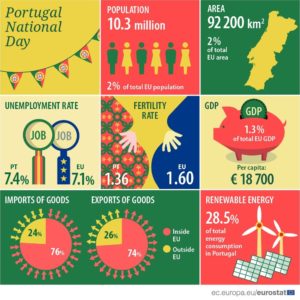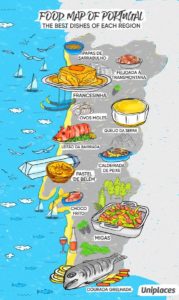‘Migration is a right, not a privilege’ – António Guterres, UN Secretary-General
The socialist-led government of Antonio Costawants attracts more immigrants to compensate for a declining population due to an extremely low birth rate. It moreover stimulates highly-qualified Portuguese – who have emigrated – to return to the homeland with bonuses up to 7500 euros.

According to the latest census, Portugal had at the beginning of this year 10.3 million inhabitants. Over the last ten years, the country lost 2.1% of its population as a result of a negative balance between births and deaths.
Meanwhile the number of ex-pats –nowadays over 7% of the population – increased substantially in the last ten years. Among the foreigners residing in Portugal, 80% originate from countries outside the EU.

The INE (National Institute of Statistics) reported that a total of 27,000 Portuguese emigrants regressed to their home country last year. The highest number since 2008!
Family and climate prove to be the main reasons for emigrants in Europe to return, according to the study ‘Return expectations of Portuguese residents in the EU by the Emigration Observatory.
The most important reasons given for leaving Portugal in the past were low wages, lack of career advancement, and poor social benefits.

Portugal has the second-highest naturalization rate in the EU after Sweden.
The nationalization rate is the ratio of the number of persons who acquire citizenship of a country during a year over the number of non-national residents in that same country.
The highest rates were registered in Sweden(8.6 citizenships granted per 100 non-national residents), followed by Portugal (5.5%) and the Netherlands (4.8%).

Last year civil registry offices received almost 200,000 applications for a Portuguese passport, almost double as in previous years! According to the Immigration and Border Service (SEF), Portuguese nationality was granted in 134,000 cases, mainly to Brazilians and Sephardic Jews. The former Portuguese colonies – Cape Verde, Angola and Guinea-Bissau – completed the top 5.

The Ukrainian community is now the second largest foreign resident community in Portugal behind the Brazilian. Before the Russian invasion, official figures pointed to some 27,000 Ukrainians living in Portugal.
In the meantime, this number has doubled.

But not only has there been a substantial increase in the number of foreign residents and Portuguese returning to their patria, the number of Portuguese leaving the country also declined. 70% fewer Portuguese moved in 2020 to the UK, the country’s top spot emigration destination.
‘Never since the beginning of the century has the drop in the Portuguese emigration to the UK been that high’, says Rui Pena Pires of the Emigration Observatory. A clear effect of the Covid pandemic but also of (post)Brexit.
Enjoy the week Boa semana (pic Público/Sapo)






 If you are what you eat (drink, smoke) or love (males, females, yourself), then countries certainly aren’t the same. There are after all innumerous appetites and lifestyles. For example, health club membership is twice as high in Spain and three times higher in Denmark.
If you are what you eat (drink, smoke) or love (males, females, yourself), then countries certainly aren’t the same. There are after all innumerous appetites and lifestyles. For example, health club membership is twice as high in Spain and three times higher in Denmark. Portuguese people take 4744 steps a day, far less than the Chinese in Hong Kong or even their Spanish neighbours. Two-thirds are not physically
Portuguese people take 4744 steps a day, far less than the Chinese in Hong Kong or even their Spanish neighbours. Two-thirds are not physically  Portuguese adore cars – one in every two owns one – and use them every day. For everything: commuting, shopping, and outings. Unfortunately, these motorists hardly ever use public transport and are keen to make
Portuguese adore cars – one in every two owns one – and use them every day. For everything: commuting, shopping, and outings. Unfortunately, these motorists hardly ever use public transport and are keen to make  Apparently not. Portuguese people love their culture and are– besides Fado, Football, and Fatima – fond of grilled sardines, Pessoa, Saramago, sunny weather and popular saints. They also
Apparently not. Portuguese people love their culture and are– besides Fado, Football, and Fatima – fond of grilled sardines, Pessoa, Saramago, sunny weather and popular saints. They also  The most stunning, however – at least according to the Observer – are the eyes of their men. Wherever you are in the world, you should look at their
The most stunning, however – at least according to the Observer – are the eyes of their men. Wherever you are in the world, you should look at their  Een tweede ontwikkeling is de toegenomen levensverwachting.
Een tweede ontwikkeling is de toegenomen levensverwachting.
 Het merendeel van de hoogopgeleide – meest universitair geschoolde – jongeren, die de afgelopen 5 jaar geëmigreerd zijn, hebben nog geen
Het merendeel van de hoogopgeleide – meest universitair geschoolde – jongeren, die de afgelopen 5 jaar geëmigreerd zijn, hebben nog geen  Door de wereldwijde crisis en de forse bezuinigingen zijn sinds 2011 – toen de economische crisis op z’n hoogtepunt was – ieder jaar meer dan 100.000Portugezen naar het buitenland vertrokken. In tegenstelling tot de jaren 60 zijn het nu vooral jonge en gekwalificeerde mensen die emigreren en is met name Engeland zeer gewild bij artsen en verpleegkundigen.
Door de wereldwijde crisis en de forse bezuinigingen zijn sinds 2011 – toen de economische crisis op z’n hoogtepunt was – ieder jaar meer dan 100.000Portugezen naar het buitenland vertrokken. In tegenstelling tot de jaren 60 zijn het nu vooral jonge en gekwalificeerde mensen die emigreren en is met name Engeland zeer gewild bij artsen en verpleegkundigen.